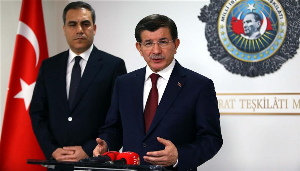Post-Putsch Narratives and Turkey's Curious Coup
By Gareth H. Jenkins
July 22, 2016
Many of the details of the failed putsch in Turkey on July 15, 2016 still remain unclear. But, although it is possible that there was some form of involvement, there are problems with the narrative being peddled by the ruling Justice and Development Party (AKP) that it was a purely Gülenist affair. What is clear is that, driven by a combination of opportunism and fear, President Tayyip Erdoğan has seized on the putsch to launch a massive crackdown that could severely destabilize an already very fragile country.
Is Turkey Becoming a Banana Republic?
By Svante E. Cornell
July 20, 2016
The failed military coup in Turkey provides a window into just how unstable and vulnerable Turkey has become. The coup is a unique but not isolated event, more than anything a symptom of the decay of Turkish state institutions under Erdogan. The sizable post-coup repression will make matters worse, in fact increasing rather than decreasing the risk of further violence, including a new coup. Turkey is now more a problem in its own right than an ally to help solve regional problems.
Taking it to the streets: Turkey's rising social tensions
By Gareth H. Jenkins
September 18th, 2015, The Turkey Analyst
The recent spate of violent protests by Turkish ultranationalists – including attempted lynchings of ethnic Kurds -- and the attacks by government supporters on the Hürriyet newspaper have reinforced already serious concerns about both the deepening fissures in Turkish society and the continuing weakening of the rule of law in the country.
The AKP Uses the “Solution Process” to Suspend the Freedom of Expression
By Burak Bilgehan Özpek (vol. 7, no. 21 of the Turkey Analyst)
The strategies of the Turkish state to deal with the Kurdish question has undergone a dramatic change since the 1990s, but what has remained constant is the state’s stance toward freedom of expression. The ruling party of Turkey has repeatedly demonstrated that it uses lofty goals like democratization to severely restrict the freedom of expression and to suspend the rule of law. “Peace” is another such goal. The AKP’s strategy in the “solution process” with the Kurdish movement rests on keeping the process secret, and stigmatizing and intimidating those who raise questions. The AKP’s strategy indicates that “peace” can be just as viable as a strategy to secure and defend authoritarian power as armed conflict.

Turkey’s Constitutional Court: The Last Resort of Hope for the Rule of Law?
By Hendrik Müller (vol. 7, no. 8 of the Turkey Analyst)
The determination of Turkey’s Constitutional Court to fulfill its role of upholding the rule of law, in spite of this putting it at odds with the mercurial prime minister, has unexpectedly presented a check on Erdoğan’s ambitions. The recent rulings of the Court raise hopes that it can be a true bastion of the rule of law. But if the allegations that its president, Haşim Kılıç, harbors ambitions to become president of the Republic were revealed to be true, those who have called the integrity of the Court into question will appear to be vindicated. That would be regrettable.







